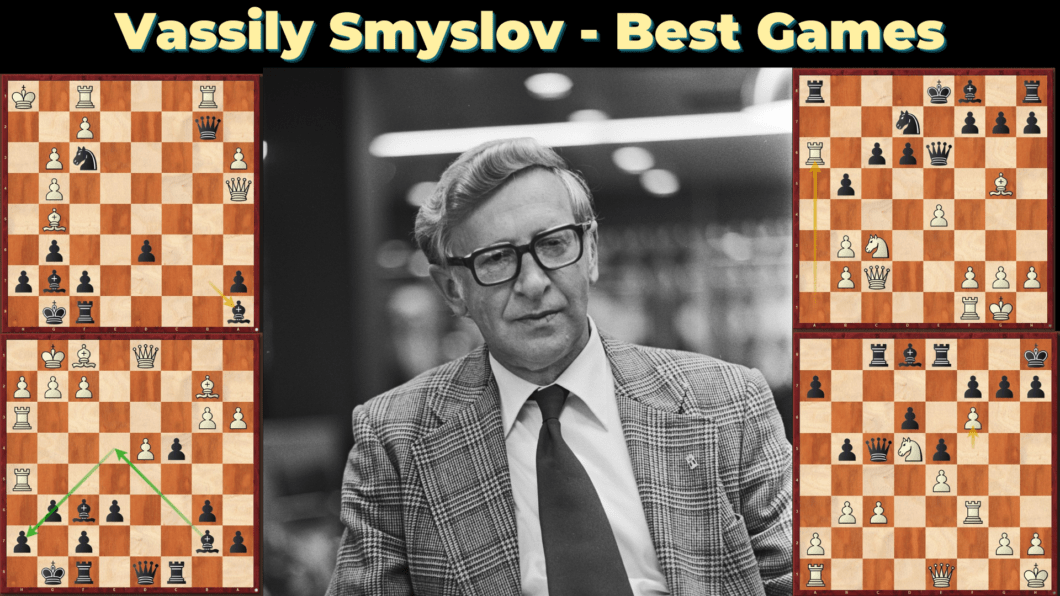The games analyzed in this article can be found in this public Lichess Study, where they have been provided in the form of mini-Chessable courses (with exercises taken from the game preceding the actual full game).
You can also download them in the .pgn format at my Chess PGN Download page.
Table of Contents
In Search For Harmony
The seventh World Chess Champion Vasily Smyslov has had a fascinating chess career in many aspects. Not only was he one of the strongest players in the world for almost a decade in the 1950s1 who participated in three World Chess Championship Matches (1954, 1957 and 1958) against Botvinnik. But he is also a very unique phenomenon in the chess world in terms of longevity – as he continued competing at a very high level until he was well in his sixties (in 1983 – at the age of 62 (!!) he reached the final of the Candidates cycle, where he lost to Garry Kasparov). Apart from Viktor Korchnoi, virtually no other player was able to compete at such a level at such an advanced age.
What was it that made Smyslov’s career so unique and long that made him stand apart from other players of his generation? Well, the first one is certainly – absolutely pure, whole-hearted, devoted love of the game – but not to the point of complete obsession as was the case, say, Fischer or some others. From every article or book I have ever read on Smyslov, it is very apparent he was completely fascinated with chess as his enthusiasm and passion simply always shine through. This is not only apparent from the very fact he continued playing it until his 60s (and beyond) – but also from the fact he published a very renowned book on the rook endgames and that he was also a very active composer of chess studies.
Another reason that is often quoted for Smyslov’s longevity is his chess-playing style. Smyslov is well-known for his positional/strategic understanding and for his exemplary endgame technique. Very often, he scored victories in a very quiet fashion, somehow imperceptibly accumulating small advantages and then slowly converting them without seemingly doing anything special. His style was often compared to Capablanca’s style in terms of simplicity and clarity. Smyslov himself wrote he was often searching for harmony at the chessboard – and it is widely accepted that such an approach preserved loads of energy and prolonged his career to the maximum.
having analyzed quite a few of Smyslov’s games and having read a book on his life and games, I am not 100% sure if such a depiction of Smyslov’s style is 100% accurate. In quite a few games in his career, he would play very energetic, tactical chess, going for material sacrifices, imbalances, and complicated, Tal-like positions – where he would often outwit/outcalculate his opponents. This is especially true of his youth, but such games can be found even in his World Championship Matches against Botvinnik, among other places.
I think it is a pity that Smyslov is almost exclusively known for his strategic/technical side as I feel this preconception of him as a player is what makes him underrated as a player and a World Champion. I have personally found his games extremely entertaining and instructive. In this article, I will present you with some of my favourite games of his. I have tried selecting some trademark Smyslov strategic victories, but also quite a few tactical games, to highlight this underrepresented, underestimated side of his a little bit more!
Hope you will enjoy it!
Vasily Smyslov Best Games
Smyslov – Kirilov, USSR, 1940.
A somewhat famous attacking gem from the early part of Smyslov’s career, featuring some brilliant, explosive combinations involving multiple look sacrifices. Well worth giving a look.
Smyslov – Botvinnik, Moscow, 1943.
Smyslov’s first-ever victory over Mikhail Botvinnik, played in the Moscow Championship at the height of WWII.
Smyslov – Rudakovsky, USSR Championship, 1945.
A very famous Sicilian game and a model example of “Occupying d5 with the knight”!
Smyslov – Reshevsky, FIDE World Championship Tournament, 1948.
Another very famous game, featured, among other things, in Kotov’s “Think Like A Grandmaster“, in the chapter about “creeping” (quiet) moves.
Keres – Smyslov, Zürich Candidates, 1953.
A very famous game, played at the crucial moment of the Zürich 1953. tournament, which enabled Smyslov to ultimately win the event and qualify for his first World Championship Match against Botvinnik.
Botvinnik – Smyslov, World Championship 1954., Game 14
Arguably Smyslov’s best game from the first World Championship match against Botvinnik.
Botvinnik – Smyslov, World Championship 1957., Game 17
Another beautiful game by Smyslov played in the World Championship match against Botvinnik – this time in 1957. This game was also played at a very crucial moment of the match, enabling Smyslov to secure a two-point lead and ultimately win the title.
Smyslov – Liberzon, Soviet Team Cup, 1968.
A beautiful game featuring a very standard, Smyslov-like strategic introduction and Tal-like complications in the later stage. Well-worth taking a look.
Smyslov – Ribli, Candidates Semifinal Match, 1983., Game 5
In 1983, Smyslov experienced sort of a swansong by qualifying for the Final Candidates Match2 against Garry Kasparov. On his way, he beat strong Hungarian grandmaster Zoltan Ribli in the semi-final – and the following game played a decisive role.
Polgar Z. – Smyslov, Münich, 2000.
Finally – one from Smyslov’s very late years – a battle against a member of the very young generation – Zsofia Polgar. Without the names, you maybe wouldn’t guess Smyslov was already 79 years old at a time – very energetic play!
References and further reading
If you want to find out more about Smyslov’s life and games, I can recommend the following two resources:
- Life and Games of Vasily Smyslov: Volume I – The Early Years by FM Andrey Terekhov
- Smyslov on the Couch by Genna Sosonko

